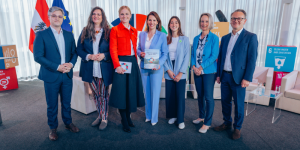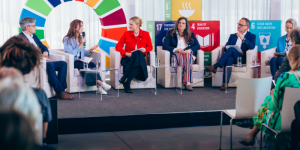On June 17th, 2024, Austria presented its second Voluntary National Review on implementing the Agenda 2030 and its Sustainable Development Goals in Vienna.
VIENNA, AUSTRIA, July 17, 2024 /EINPresswire.com/ — Federal Minister for the EU and Constitution, H.E. Karoline Edtstadler, presented Austria’s 2nd VNR at the national “pre-launch” of the VNR on June 17, 2024 – exactly one month before the report’s presentation to the United Nations in New York – at the MQ Libelle in Vienna. The event was co-organized by the Austrian Federal Chancellery and the Ban Ki-moon Centre for Global Citizens.
In recent years, Austria has made great progress in achieving the Sustainable Development Goals (SDGs). This is a result of the close cooperation of all stakeholders: The Austrian federal government, the federal states, cities and municipalities, businesses, science, civil society, social partners, and youth. They have worked together with numerous other SDG stakeholders throughout the country to implement the SDGs on all levels. The report was developed in a broad consolidation process over the last 15 months with the transparent and broad involvement of all Austrian SDG stakeholders.
On June 17th, 2024, Austria took the rare opportunity to nationally present the report before its official presentation to the UN at the High-Level Political Forum on Sustainable Development in New York (HLPF). This is not only an opportunity to look back on the progress made, but it is also a sign that Austria is an active player in the global SDG community and is leading by example, emphasized Monika Froehler, CEO of the Ban Ki-moon Centre for Global Citizens and moderator at the beginning of the event.
The 2nd VNR provides a detailed assessment of SDG implementation in Austria, showcasing measures, progress, and areas needing improvement. A highlight was the premiere of a video presenting the report, featuring success stories from Austrian stakeholders. Out of over 250 submissions, 120 were included, illustrating diverse initiatives like regionally generated green electricity, meat-free delicacies, and innovative education and care programs. These examples highlight the commitment of Austrian stakeholders and encourage further involvement with the SDGs.
During the official presentation of the 2nd VNR, Federal Minister Karoline Edtstadler highlighted the SDGs as a “compass in times of change,” enabling coordinated progress despite challenges. The report documents SDG implementation and necessary transformations, divided into three focus chapters on social, economic, and environmental dimensions, and addresses cross-cutting issues like gender equality. Spanning over 270 pages, it includes extensive data on progress and areas needing action.
Minister Edtstadler stressed the collective responsibility to ensure a sustainable future, praising Austria’s achievements in SDG 1 (No Poverty) and SDG 7 (Affordable and Clean Energy), while noting ongoing challenges in SDG 12 (Sustainable Consumption and Production), SDG 13 (Climate Action), and SDG 15 (Life on Land).
The subsequent panel discussion featured representatives from various areas of society, who shared their experiences and perspectives on the report and SDG implementation:
Jana Berchtold, member of the Federal Youth Council and UN Youth Delegate 2023-25, represented the interests of young people and highlighted their involvement in SDG implementation and reporting.
Alexandra Wegscheider-Pichler, SDG-coordinator and senior expert of Statistic Austria, emphasized the data-based approach of SDG work in Austria. Austria’s extensive database has often been highlighted as good practice by the United Nations.
Lukas Wank, representative of SDG Watch Austria and Managing Director of the Global Responsibility Working Group, spoke about the role of civil society and the global perspectives on SDG implementation.
Gerald Berger, independent consultant and former network manager of the European Sustainable Development Network, contributed insights into the reporting processes of other European countries and added an external perspective.
Gabriela Maria Straka, Board member of RespACT and Director of Corporate Affairs & ESG Sustainability at Brau-Union Austria, reported on sustainable business practices and the involvement of RespACT in the 2nd VNR.
The panel discussion highlighted diverse perspectives on the report’s preparation and content. Statistics Austria’s improved objective database was praised as essential for fact-based sustainable development, though further innovations were encouraged. Experiences from Finland, Denmark, and Switzerland were discussed, emphasizing peer reviews and exchanges. Gerald Berger identified three crucial elements: coordination within ministries, stakeholder involvement, and honest analysis. Lukas Wank noted the challenge of spillover effects and highlighted the report’s evolution in four areas: strategic perspective, synergy processes, civil society involvement, and spillovers to poorer countries.
Gabriela Maria Straka from RespACT and Brau Union Austria discussed integrating SDGs into business, particularly in the circular economy and supply chain management. She noted that companies increasingly see SDGs as both morally important and economically beneficial. Jana Berchtold from the Federal Youth Council emphasized continuous youth involvement, citing the Rebels of Change – SDG Youth Forum as a positive example.
Overall, the discussion underscored the importance of transparency, intersectoral cooperation, good practice exchange, and administrative coordination in achieving global sustainability goals.
Ambassador Peter Huber from the Austrian Ministry of European and Foreign Affairs closed the event by thanking all participants and SDG stakeholders who contributed to the successful implementation of the 2nd VNR and the discussion on the SDGs.
In short, the national pre-launch of Austria’s second Voluntary National Review on the implementation of the SDGs represents an important milestone that shows that Austria is well on the way to fulfilling its commitments to the SDGs and that even in times of great challenges, much can be achieved through partnership and cooperation at all levels.
On July 17, 2024, Austria will present its second Voluntary National Review on the implementation of the 2030 Agenda for Sustainable Development at the United Nations High-Level Political Forum. Federal Minister Karoline Edtstadler will deliver this report at 10.00 AM (EDT). Livestream is available on UN Web TV.
Katharina Choe
Ban Ki-moon Centre for Global Citizens
email us here
Livestream of the Pre-Launch-Event of Austria’s 2nd VNR
![]()







